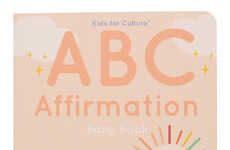
'Lil' Libros' is a Set of First Concept Books for Hispanic Families
Joey Haar — November 20, 2017 — Life-Stages
Bilingualism is important, and the books from Lil' Libros help parents to introduce their children to first concepts in both English and Spanish, providing the initial framework through which language grows. The books not only teach first concepts (like numbers, emotions, colors, and more) in Spanish, but they also introduce important figures from Latino culture, giving children a cultural and historical background as well.
Lil' Libros was started by two Latinas who found that there weren't enough baby books that catered to their personal experiences. They were looking for books they could read to their young children that would reflect their culture, but there was little available. In light of the dearth of potential options, they two created a series themselves.
Many of the concepts in the books are framed with historical figures and mythical characters like Frida Kahlo, Zapata, Guadelupe, and La Llorona.
Lil' Libros was started by two Latinas who found that there weren't enough baby books that catered to their personal experiences. They were looking for books they could read to their young children that would reflect their culture, but there was little available. In light of the dearth of potential options, they two created a series themselves.
Many of the concepts in the books are framed with historical figures and mythical characters like Frida Kahlo, Zapata, Guadelupe, and La Llorona.
Trend Themes
1. Bilingualism in Early Education - Exploit the demand for bilingual educational resources by creating more first concept books that introduce multiple languages to young children.
2. Cultural Representation in Children's Literature - Tap into the need for diverse and inclusive books by incorporating important figures from different cultures and backgrounds in children's literature.
3. Cross-cultural Education - Develop educational materials that not only teach basic concepts but also provide a cultural and historical background for children from different ethnicities.
Industry Implications
1. Publishing - Publishing houses can seize the opportunity to create a wide range of bilingual and culturally diverse books for children, catering to the growing market demand.
2. Education - Educational institutions can integrate bilingual literature and cross-cultural education into their curricula to promote inclusivity and global understanding among students.
3. E-commerce - Online retailers can curate a selection of bilingual and culturally diverse books, targeting parents who embrace the importance of early education and multiculturalism.
1.8
Score
Popularity
Activity
Freshness























